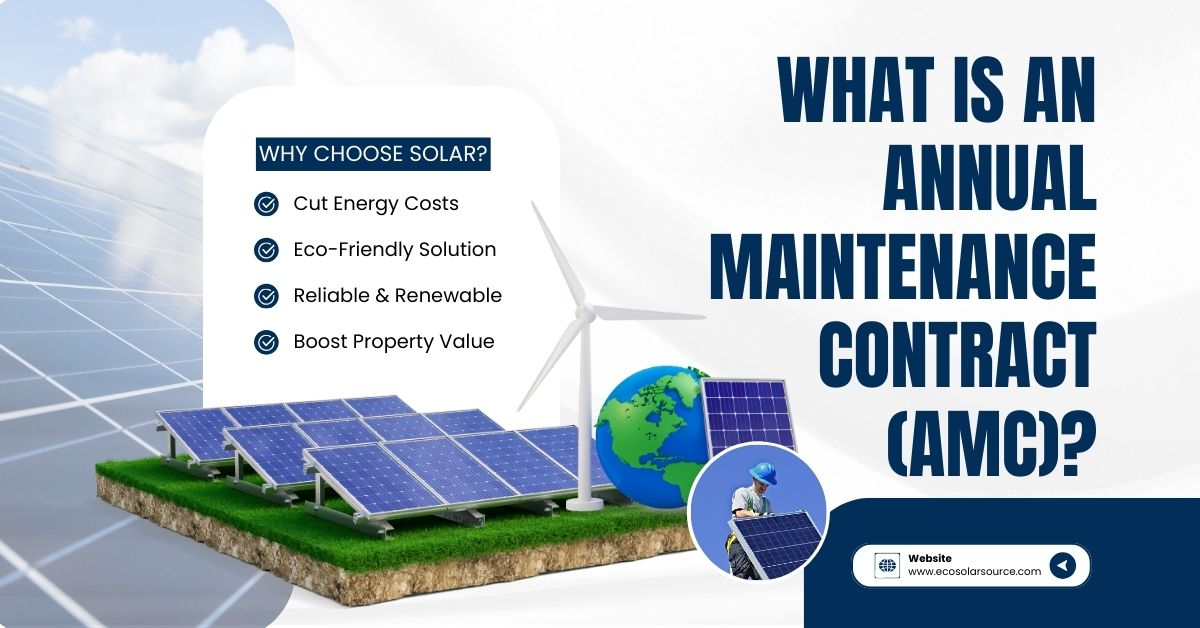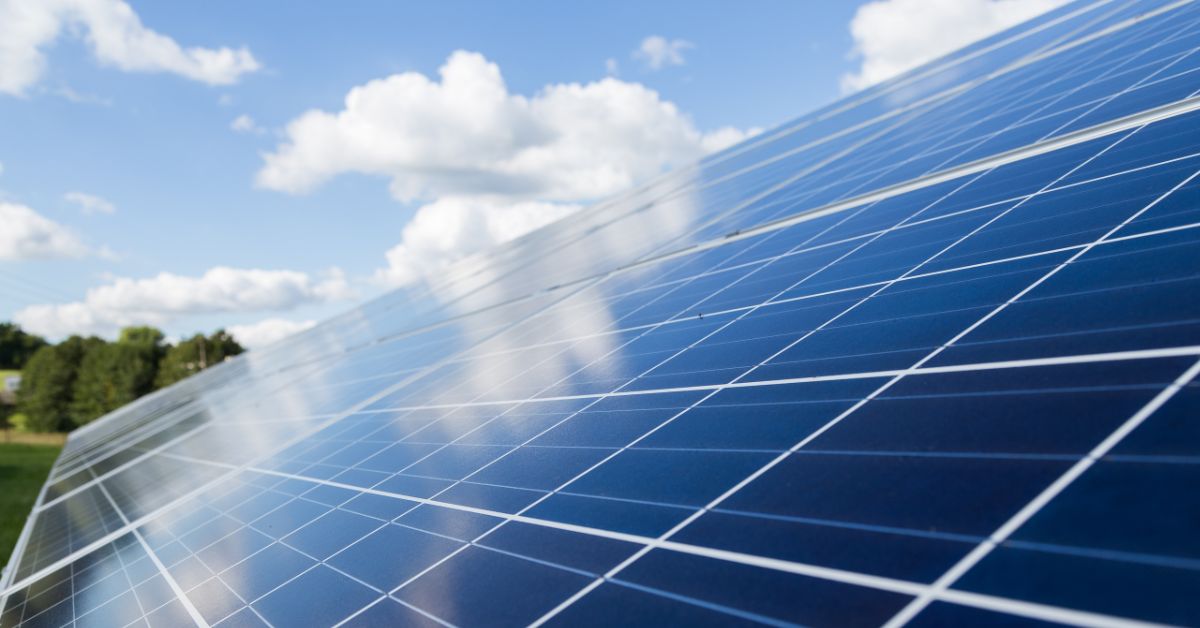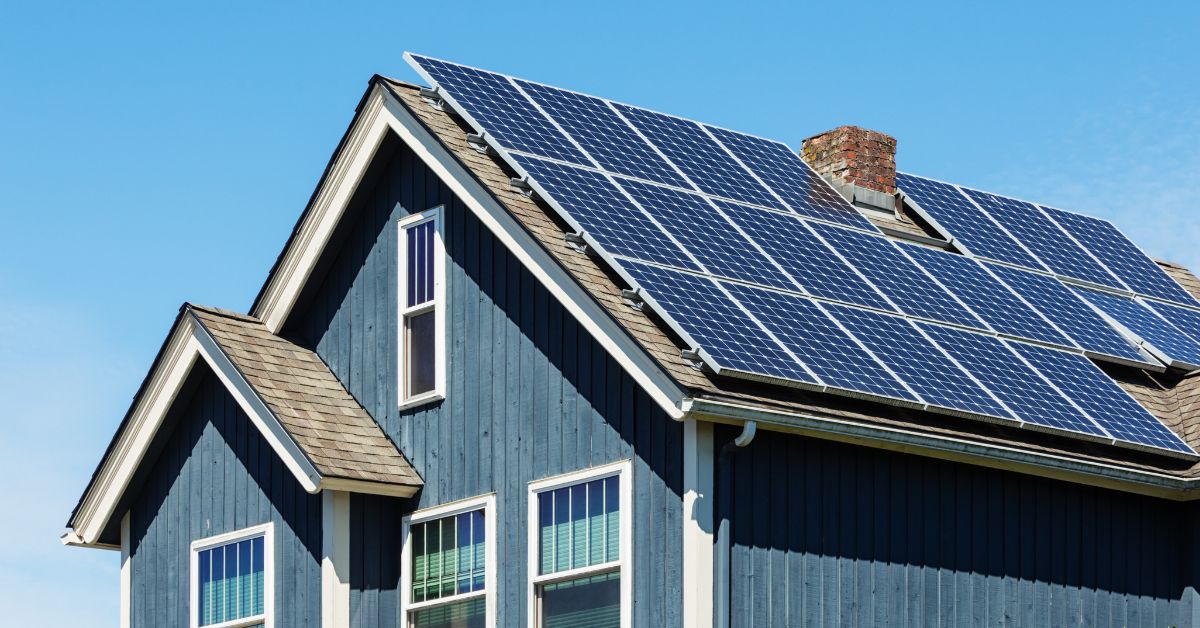Annual Maintenance Contracts for Solar Systems All You Must Know
Know the details about Annual Maintenance Contracts for Solar Systems All You Must Know, Annual Maintenance Contracts (AMCs) for solar systems are essential agreements that ensure your solar power setup operates at peak efficiency year-round. These contracts cover routine inspections, cleaning, and servicing of panels, inverters, and batteries, helping prevent unexpected failures and costly repairs. With AMCs, technicians monitor system health, check wiring, and update firmware, maximizing energy output.
AMCs often include emergency support, providing peace of mind and prolonging your solar investment’s lifespan. They’re especially beneficial in harsh climates where dust, heavy rains, or snow may impact performance. An AMC guarantees optimized, reliable solar performance with predictable maintenance costs, ideal for sustainable energy.
Table of Contents
Annual Maintenance Contracts for Solar Systems All You Must Know
As solar energy becomes more accessible and affordable, an increasing number of homes and businesses are transitioning to solar power. Solar systems are highly efficient and offer long-term benefits like reduced energy costs, energy independence, and environmental friendliness. However, like any other system, solar installations require regular maintenance to perform optimally over time. This is where Annual Maintenance Contracts (AMCs) come into play.
In this comprehensive guide, we’ll explore everything you need to know about Annual Maintenance Contracts for solar systems, from what they are to why they’re essential, the types of services offered, pricing models, and tips for selecting the right service provider.
What is an Annual Maintenance Contract (AMC)?
An Annual Maintenance Contract (AMC) is an agreement between the owner of the solar system and a service provider. The contract typically ensures that the solar system will be regularly inspected, cleaned, and maintained for a specific period—usually one year—with an option for renewal.

The main purpose of an AMC is to ensure that your solar energy system operates at peak performance throughout its lifespan. Regular maintenance and timely interventions can extend the life of your system, improve efficiency, and prevent costly breakdowns.
Why is Maintenance Crucial for Solar Systems?
Solar systems are designed to last 25-30 years, but that doesn’t mean they don’t need attention during that time. Solar panels, inverters, and other system components face wear and tear due to various environmental factors like:
- Dust and debris accumulation
- Weather conditions such as hail, storms, and heavy rainfall
- Temperature fluctuations
- Animal interference, including birds nesting on or near panels
- Wiring issues caused by rodents
Even though solar systems are low-maintenance compared to traditional energy sources, periodic maintenance is essential to ensure:
- Optimal Efficiency: Dust, bird droppings, and debris can reduce the efficiency of solar panels by up to 30%.
- System Longevity: Properly maintained systems have fewer breakdowns and can last longer than those neglected.
- Early Problem Detection: Regular inspections can help detect potential issues before they become costly to fix.
- Compliance with Warranty Conditions: Many solar manufacturers and installers require regular maintenance for warranty claims to remain valid.
Components of Solar Systems Covered in an AMC
An AMC usually covers the following key components of a solar system:
A. Solar Panels
Solar panels are the most visible part of a solar system and, naturally, the most exposed to environmental elements. Regular cleaning and inspections ensure that they continue to capture sunlight efficiently.
B. Inverters
Inverters convert the direct current (DC) produced by the solar panels into alternating current (AC), which powers homes and businesses. Faulty inverters can disrupt the entire system, so regular checks are vital.
C. Batteries (for systems with storage)
If your solar system includes battery storage, maintaining the health of the batteries is essential for reliable energy supply during power outages or nighttime use.
D. Mounting Structures
The racking systems or mounting structures hold your solar panels in place. Over time, bolts can loosen, or the structure can be affected by weather conditions. Regular inspections ensure that the mounting remains secure.
E. Electrical Wiring
Electrical connections and cables can deteriorate over time due to exposure to sunlight, moisture, or animal interference. Ensuring proper wiring is crucial for safety and efficiency.
F. Performance Monitoring Systems
Many modern solar systems come with monitoring systems that track energy production and performance. These systems need regular updates and calibration to ensure they provide accurate data.
Types of Maintenance Services in an AMC
AMCs for solar systems generally cover two types of maintenance services:

A. Preventive Maintenance
Preventive maintenance is the cornerstone of any AMC. The goal is to prevent problems before they occur. Key tasks include:
- Cleaning of solar panels
- Visual inspections of all system components
- Tightening of electrical connections
- Testing and calibration of inverters and performance monitoring systems
- Inspection and cleaning of the battery storage unit (if applicable)
- Examination of mounting structures and electrical wiring
Preventive maintenance is usually scheduled quarterly, bi-annually, or annually depending on the contract terms.
B. Corrective Maintenance
Corrective maintenance involves fixing issues that have already arisen, such as:
- Replacing faulty inverters
- Repairing or replacing damaged panels
- Fixing loose wiring or broken mounting structures
- Addressing issues with the monitoring system
- Battery replacement or servicing
Corrective maintenance is typically performed on an “as-needed” basis, and many AMCs include provisions for emergency repairs.
Benefits of an Annual Maintenance Contract
Opting for an AMC comes with numerous advantages, some of which include:
A. Maximized System Efficiency
With regular cleaning and inspections, your solar panels can maintain optimal efficiency, ensuring you get the most out of your investment.
B. Reduced Downtime
Unexpected system failures can lead to prolonged downtime, during which you may have to revert to using conventional grid power. An AMC helps reduce the likelihood of system downtime by keeping everything in top condition.
C. Cost Savings
Though AMCs require an upfront investment, they often save money in the long run by preventing expensive repairs and extending the system’s lifespan.
D. Peace of Mind
With an AMC in place, you don’t have to worry about when to schedule maintenance or what issues might be lurking within your system. The service provider takes care of everything, offering peace of mind.
E. Compliance with Warranties
Manufacturers often require proof of regular maintenance to honor warranties. By adhering to the terms of the AMC, you maintain warranty compliance.
Common AMC Plans and Pricing Models
Solar system AMCs come in a variety of pricing models and plans based on factors like system size, location, and the specific services you need. Here are some of the most common plans:
A. Basic AMC
- Typically includes panel cleaning and basic visual inspections.
- Ideal for smaller systems and homeowners who want to ensure minimal maintenance.
- Costs range between $100 to $300 annually for a residential system.
B. Comprehensive AMC
- Includes preventive and corrective maintenance, plus emergency services.
- Covers all system components: panels, inverters, wiring, and batteries (if applicable).
- Suitable for larger systems and commercial installations.
- Costs range between $500 to $1,500 annually, depending on system size and complexity.
C. Customized AMC
- Tailored plans that are designed according to the specific needs of the solar system owner.
- May include additional services like battery monitoring, system upgrades, and 24/7 support.
- Pricing is customized based on the services offered.
D. Pay-As-You-Go
- This model allows users to pay for maintenance services as needed rather than committing to an annual contract.
- Suitable for those with limited budgets or those who prefer occasional servicing.
- Costs vary depending on the service, but a single cleaning session could range from $50 to $150.
Choosing the Right AMC Provider
Selecting the right AMC provider is just as important as choosing the right solar system. Here are some tips to guide you:
A. Experience and Expertise
Look for providers with a proven track record in maintaining solar systems. They should be familiar with the technology, the specific components of your system, and any brand-specific requirements.
B. Range of Services
Make sure the provider offers a comprehensive range of services that meet your system’s needs. Some providers may specialize in residential systems, while others focus on larger, commercial setups.
C. Emergency Support
It’s essential to select a provider who offers emergency support. In the event of a major breakdown, you’ll want someone who can respond promptly to minimize downtime.
D. Transparency
Choose a company that is transparent about its services, pricing, and contract terms. The last thing you want is hidden fees or unclear service expectations.
E. Reviews and Testimonials
Before signing any contracts, check reviews and testimonials from previous clients to gauge the provider’s reliability and service quality.
F. Warranty Compatibility
Ensure that the AMC provider’s services comply with the warranty conditions of your solar system components, especially the inverters and panels.
Common Issues Detected During AMC Maintenance
During routine AMC inspections, technicians often discover issues that may otherwise go unnoticed. Some of the common problems include:

A. Dirty or Shaded Panels
Dirty panels or those partially covered by trees or nearby structures can reduce efficiency. Regular cleaning and trimming of nearby foliage can prevent this issue.
B. Wiring Degradation
Over time, electrical wiring can degrade due to exposure to the elements or rodent interference. Loose or faulty wiring is a frequent issue uncovered during inspections.
C. Inverter Failure
The inverter is often the most vulnerable component in a solar system. Regular checks can identify early signs of failure, allowing for timely replacement.
D. Mounting Issues
Mounting structures can loosen over time due to wind, rain, or thermal expansion. Addressing these issues early helps avoid more significant problems.
E. Battery Deterioration
For systems with storage, battery health is crucial. Regular inspections can identify when batteries are nearing the end of their lifespan, ensuring a smooth replacement process.
AMC and Performance Monitoring Integration
Modern solar systems often come with performance monitoring systems that track energy generation and usage in real time. Many AMCs now offer integration with these monitoring systems, providing added benefits:
- Proactive Maintenance: If the system detects a drop in energy production, it can alert the service provider, prompting a maintenance check before the issue worsens.
- Data-Driven Decisions: Performance data can help technicians identify trends or issues in system efficiency, allowing for more targeted maintenance.
- Remote Monitoring: Some providers offer remote system monitoring, enabling them to spot potential issues and resolve them without needing an on-site visit.
The Future of Solar Maintenance
As solar technology continues to evolve, so do the methods of maintaining these systems. Some of the future trends in solar maintenance and AMC include:
A. Automated Cleaning Systems
Robotic cleaners and automated solutions are being developed to clean solar panels without the need for human intervention. These systems can be especially useful for large commercial arrays in remote locations.
B. Predictive Maintenance with AI
Artificial intelligence and machine learning are being integrated into performance monitoring systems to predict when a component might fail. This predictive maintenance approach can save costs by addressing problems before they lead to failure.
C. Drone Inspections
Drones equipped with thermal imaging cameras can inspect large solar farms for faulty panels, wiring issues, or other defects more efficiently than traditional methods.
FAQs About Annual Maintenance Contracts for Solar Systems All You Must Know
Q1. What is an Annual Maintenance Contract (AMC) for solar systems?
An AMC for solar systems is an agreement between the solar system owner and a service provider to ensure regular maintenance, cleaning, and troubleshooting for optimal system performance. It typically includes scheduled inspections and service visits to keep the system running efficiently.
Q2. Why is an AMC important for solar systems?
Solar systems are exposed to environmental elements like dust, debris, and weather variations, which can impact performance over time. Regular maintenance through an AMC maximizes energy output, extends the system’s lifespan, and helps prevent costly repairs.
Q3. What services are typically included in an AMC for solar systems?
Services generally include panel cleaning, system inspection, inverter checks, performance monitoring, troubleshooting, and minor repairs. Some AMCs also offer remote monitoring and emergency visits if the system encounters issues.
Q4. How often should a solar system be serviced under an AMC?
Typically, a solar system under AMC is serviced quarterly or bi-annually, but the frequency may vary based on factors such as system size, location, and manufacturer guidelines. Many contracts specify at least two to four maintenance visits per year.
Q5. How much does a solar AMC typically cost?
AMC costs vary depending on factors like system size, the service provider, and the services included. For residential systems, costs may range from $100 to $300 per year, while larger commercial systems may incur higher fees based on complexity and scale.
Q6. Will an AMC improve the energy output of my solar system?
Yes, an AMC ensures that the solar panels and system components are regularly cleaned and functioning properly, which can improve energy output. This upkeep ensures that dirt or minor technical issues don’t interfere with efficiency, helping you get maximum power from your system.
Q7. Does a solar AMC cover all repairs and replacements?
Basic AMCs typically cover minor repairs and adjustments, but major repairs, component replacements (like inverters or batteries), and extensive upgrades may incur additional charges. Premium AMCs or extended warranties may include more comprehensive coverage.
Q8. Is it mandatory to have an AMC for a solar system?
An AMC is not mandatory but highly recommended. While solar systems generally require low maintenance, regular servicing through an AMC can prevent issues, maintain efficiency, and avoid unexpected costs due to neglect or infrequent servicing.
Q9. Can I perform the maintenance myself instead of getting an AMC?
Some maintenance tasks, like panel cleaning, can be done by the owner. However, professional servicing is advisable for detailed inspections, technical troubleshooting, and electrical safety checks that require expertise and specific tools.
Q10. How do I choose the right AMC provider for my solar system?
Choose an AMC provider with a good reputation, experience with your specific solar system type, and customer reviews to back their services. Look for providers that offer comprehensive packages, flexibility in contract terms, and transparency in pricing and services.
Annual Maintenance Contracts (AMCs) for solar systems are crucial for ensuring the longevity, efficiency, and reliability of your investment in renewable energy. By opting for an AMC, you can avoid unexpected breakdowns, maximize energy production, and ensure that your solar system operates at its peak performance for decades. Whether you’re a homeowner with a small rooftop system or a business with a large solar farm, an AMC is a wise investment that pays off in the long run.
Before committing to an AMC, ensure that you understand the types of services offered, the cost structure, and the provider’s reliability. With the right AMC in place, you can enjoy the benefits of solar energy with minimal hassle, knowing that your system is in expert hands.
Click here to learn more about Annual Maintenance Contracts for Solar Systems All You Must Know
Click here to learn more about Evaluate and Compare Solar System Providers in Delhi NCR

